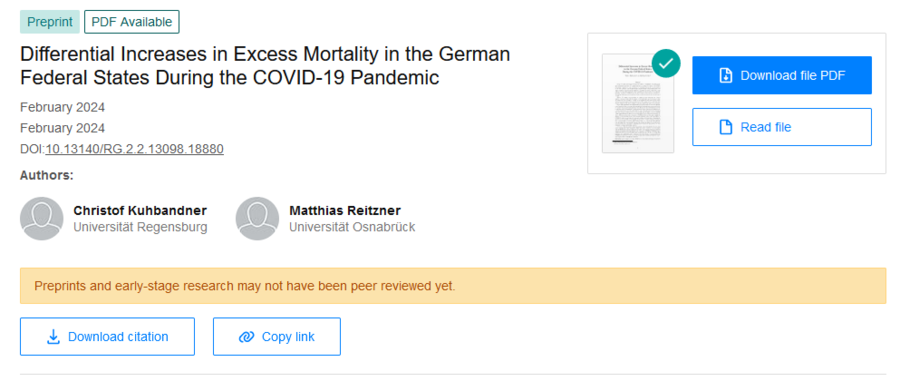
Did a German preprint study published in February 2024 by Christof Kuhbandner and Matthias Reitzner prove that COVID-19 vaccines caused the number of deaths per year to rise above recent trends, as several online posts and articles implied? No, that's not true: While it's true there has been a documented increase in excess mortality during the pandemic years, German health officials report that these were primarily seen in elderly populations and were influenced by excessive heat, flu cases and COVID deaths. A molecular biologist told Lead Stories that the study does not prove that COVID vaccines caused excess deaths. It simply showed that following vaccine rollouts, there was an increase in excess deaths -- a rise that can be attributed to many factors that the study did not account for.
The claim originated in a preprint study (which means that scientists with relevant expertise have not rigorously reviewed it yet) titled "Differential Increases in Excess Mortality in the German Federal States During the COVID-19 Pandemic" (archived here), shared online in February 2024. It was published by two German researchers who claim a correlation between vaccination rates and an increase in German excess mortality proves that COVID-19 vaccines "may have had a negative effect instead of a positive effect."
They argue that this is shown by the fact that Germany saw an increase in excess mortality rates in the second and third pandemic years (2022 and 2023), when vaccination rates were at their highest.
Below is how the study appeared at the time of this publication:
(Source: ResearchGate screenshot taken Friday July 5 05:21:00 UTC 2024)
The preprint study was shared online in the months following to imply that the study had proved COVID vaccines were harmful. Versions of this claim were posted by the likes of Steve Kirsch, whose claims Lead Stories has debunked before, as well as by The People's Voice, a publication with a record of publishing false stories in the past.
Michael Imperiale (archived here), a molecular biologist at the University of Michigan Medical School (archived here) who is not affiliated with the study, told Lead Stories that the correlation presented in the German study does not accurately reflect COVID vaccine outcomes and that "correlation is not causation."
"If the vaccine did indeed lead to excess mortality, this would have been seen globally since most places used the same vaccines. Unless there is some Germany-specific co-factor," Imperiale told Lead Stories in an email received on July 8, 2024.
What are excess deaths?
The Centers for Disease Control and Prevention (archived here) define excess deaths as the difference between the number of observed deaths and those expected.
The study was not rigorously reviewed by scientific peers
The German study had yet to undergo peer review at the time this fact check was published. Peer review is essential to the scientific process as it allows the scientific community to review, edit, comment, and critique research in advance of publication. It is intended to improve the quality of published research, as scientific peers can flag mistakes and highlight limitations or other issues in the research, giving scientist authors the opportunity to correct or revise their report on their work or go back and re-do their study.
Increase in excess deaths caused primarily by heat and flu season, officials say
The paper is correct that there was an increase in excess deaths in Germany during the pandemic years between 2020 and 2022. In a January 20, 2023, press release (archived here), the Leibniz Institute for Economic Research at the University of Munich confirmed that around "180,000 more people died in Germany than would have been normally expected." This was especially prevalent in the "poorly protected" elderly group, a group that is simply more susceptible to death due to age, health and lifestyle.
German health officials report these excess deaths were largely attributed to heat waves and a particularly intense flu season. According to the press release:
In the 80+ age group alone, 116,000 more people died than expected; in the 60-79 age group, the figure was 51,000. In the large age group of 30-59, on the other hand, there were only 12,000 additional deaths, and only about 900 among those aged 0-29.
Examining the data year-by-year
On July 2, 2024, the German Federal Statistics Office published (archived here) an evaluation of mortality figures since 2020, noting that a seasonal pattern was observed in each of the three pandemic years, 2020 to 2022, showing "markedly higher death figures towards the end of the year and even extraordinary increases compared with pre-pandemic years."
In 2020, for example, country officials noted an increase in deaths due to COVID and an increase in death figures 32 percent higher than the previous year's median. Additionally, excess deaths increased in the summer due largely to heat waves.
During the second COVID wave in 2021, excess deaths in Germany exceeded the median of the preceding four years by 26 percent. Health officials note that there are several possible causes for the additional increase in death figures, for instance:
Unidentified COVID-19 deaths or the displacement of deaths within the year caused by the absence of the usual flu wave at the beginning of the year may play a role here (mortality displacement). It is also possible that this reflects the consequences of postponing operations and preventive examinations. However, it is currently impossible to quantify individual effects' relative impact.
The German Federal Statistics Office adds that "exceptionally high death figures at the end of 2021" can also be credited to a heat (archived here) and flu waves (archived here) that occurred in the summer and winter, respectively.
Though life expectancy was trending upward during the pandemic, German health officials reported that in 2022,death figures rose again by 3.4 percent. This can be attributed to a COVID wave between March and May, increased deaths due to heat records, and a second increase in COVID deaths at the end of the year. Additionally, there were incidents of respiratory diseases from November onwards that "exceeded the peak of serious waves of influenza in previous years (archived here).
Similarly, mortality figures in 2023 were also exceptionally high compared to pre-pandemic years, with influenza and respiratory disease being a contributing factor.
What the study authors had to say
Lead Stories reached out to the study authors, Christof Kuhbandner (archived here), a psychologist at Universität Regensburg, and Matthias Reitzner (archived here), a mathematician at the Universität Osnabrück. In an email received on July 8, 2024, Reitzner stood by his findings. In the paper, the study authors concluded their work proves a "significant positive correlation between the increase of excess mortality and COVID-19 vaccination."
In his email, Reitzner wrote, "causality and correlation are different terms, and as is generally known, correlation does not necessarily mean causality. Yet if there is causality this should imply correlation."
The Michigan molecular biologist, Michael Imperiale, scoffed at that logic, pointing out that "Gasoline prices increased in 2023. Is that due to the COVID vaccine?"
Lead Stories contacted the German Federal Statistics Office and the Germany government's Robert Koch Institute for medical research for comment. When they reply, we will update this article, as appropriate.
At the time this was written, Techarp had reviewed the same claim.


















